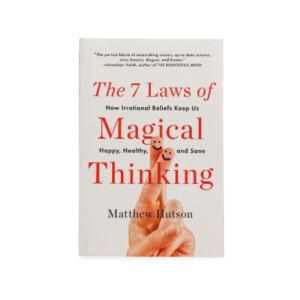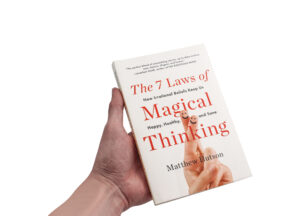Magic has fascinated humanity since the beginning, yet its meaning and implications remain a topic of profound wonder, debate and inspiration throughout history. In this article, we’ll explore the profound differences between white magic and black magic, shedding light on their spiritual significance and the ways they influence our lives.
From ancient civilizations to modern spiritual practices, magic has often been viewed as a bridge between the natural and supernatural realms. But what exactly is magic? Is magic the same as witchcraft? And how do we differentiate between “white magic” and “black magic”? This article delves into these questions, exploring historical, philosophical, and theological perspectives on the subject. Whether you’re new to the concept of magic or seeking to deepen your understanding, this guide will help you unravel the mysteries of these ancient practices.
Magic as Advanced Technology: A Reflection on Perception
Imagine traveling back in time with a modern smartphone. To a society unfamiliar with such technology, a device capable of showing moving images, capturing moments, and providing instant communication would seem otherworldly—perhaps even magical. The smartphone would have been mistaken for a mirror imbued with supernatural powers, and the person wielding it labeled a witch performing “sorcery”. This thought experiment illustrates a critical point: what we perceive as “magic” is often a reflection of our understanding—or lack thereof.
Arthur C. Clarke famously stated, “Any sufficiently advanced technology is indistinguishable from magic.” By extension, this principle can apply to spiritual practices and metaphysical phenomena. Could it be that what we describe as magic today is simply advanced spiritual technology—mechanisms of the universe that we have yet to fully comprehend or explain? If so, this perspective urges us to reconsider how we define “magic.” Perhaps magic is not inherently mystical but a branch of physics or metaphysics awaiting discovery.
Another great example to further illustrate this thought exercise, is the popular TV series Outlander. This TV show provides a compelling example of how advanced knowledge can be misconstrued as magic. In the show, Claire Fraser, a 20th-century doctor, accidentally travels back in time to 18th-century Scotland. Using her modern understanding of medicine, she heals people with herbal mixtures (which we now know as medicine) and performs advanced medical procedures. However, her skills are perceived as supernatural by the less advanced society of the time, and she is labeled a witch practicing witchcraft. This storyline underscores how societal context shapes the perception of magic. What Claire understands as science and medicine is misinterpreted as dark magic, a reflection of the time period’s limited knowledge. Her experience mirrors the broader theme that magic is often just advanced knowledge or technology viewed through the lens of an uncomprehending society. This serves as a reminder to approach metaphysical practices today with curiosity and humility, recognizing that what we don’t yet understand may simply be an extension of the natural laws of the universe.
So the real question emerges: What exactly is magic? And what do you define as magic and where do you draw the line? Magic carries a unique meaning for each individual, shaped by their beliefs, experiences, and cultural context. Its essence transforms depending on the lens through which it is viewed.
Keep in mind that white magic can also be known by different names depending on the culture or tradition you come from. For example, it may be referred to as the Holy Spirit in Christian contexts, prana in Hindu philosophy, chi in Chinese traditions, mana in Polynesian beliefs, ruach in Hebrew teachings, or lifeforce in more universal spiritual practices. Each term reflects the same underlying concept: a divine, life-giving energy that came from Source and flows through and connects all living things.
White Magic vs. Black Magic: The Fruit Test
It is important to recognize that there is good magic and there is evil magic. Not all magic is inherently good, just as not all magic is evil or negative. Similarly, technology and tools can be used for either good or harmful purposes, depending on the intent behind their use. It all comes down to how it is used and the final result. Throughout history, magic have been categorized as either white magic or black magic, with stark differences in their intent, origins, and effects. White magic is benevolent, and comes from God, while black magic is destructive and aligned with malevolent forces. God is the source of all creation, including white magic, and he filled this world with “magic” for lack of better words. This reality is infused with magic and it is in all of his creation — in us and all around us.
Jesus offers a simple yet profound metric for discerning the nature of spiritual acts (magic): “By their fruits, you will know them” (Matthew 7:16). This means that the outcomes of spiritual practices (magic)— whether they foster goodness or harm — reveal their true nature. White magic, or miracles, stems from a desire to uplift, heal, and serve others, reflecting God’s love and purpose. In contrast, black magic exploits spiritual gifts for selfish gain, often causing harm or suffering to others.
Think about it: praying is a form of magic — in this case, white magic—because you are connecting with God (or one of His angels or light beings) and seeking and manifesting blessings. However, the moment your prayers are aimed at causing harm to an innocent living being, or if you are connecting with a malevolent spirit, it transforms into witchcraft and black magic.
Examples of white magic, referred to as miracles often by religious groups (which Jesus exhibited by the way), might include using spiritual gifts to heal the sick, provide comfort to the downtrodden, or manifest abundance for the greater good. Black magic, on the other hand, involves practices that manipulate others, sow discord, or prioritize personal advancement at the expense of others’ well-being or hurt others.
Like Jesus said, you will know if your actions are good by the fruits of your work. This principle applies to both magic and the life choices you are making. A great exercise to better understand what type of magic you are engaging in — or to determine if your actions are righteous — is to ask yourself the following questions:
- Is it based in love?
- Am I certain this is not causing harm to any living being?
- Am I connecting to God’s energy and His light beings, angels, or benevolent spirit guides when doing this?
- Am I respecting myself and others?
If the answer is “yes” to all these questions, you can rest assured that you are on the right path and you are not doing black magic or committing a sin.
A word of caution: Why Staying on the Away from Black Magic Matters
At Crystal Dreams, we strongly believe in the importance of staying on the right path — a path that honors God and strives to make the world a better place for all living beings. With this in mind, we feel it is necessary to offer a word of caution to those who may be tempted to meddle with black magic: it is simply not worth it.
God has already provided you with all the tools and powers you need to create a fulfilling and prosperous life through the spiritual gifts bestowed upon everyone. One of these gifts, among many, is the capacity to direct and control your mind towards achieving and manifesting whatever your desire — what some may also refer to as “magic”. The only true limitations are those you place upon yourself or allow others to impose upon you. This gift alone has the potential to take you further than anything black magic could ever offer. This belief, when mixed with a burning desire and applied faith, is the most powerful magic in the universe. And it was given by God to all human beings to be used for good. If you want to learn more about this powerful magical gift that God gave you, we strongly recommend reading the book Think and grow rich by Napoleon Hill or watching the documentary The Secret.
Unfortunately, some people have used this gift for evil, hence turning it into black magic. Think of Hitler and everything he achieved with the power of his mind, only to have it all turn into a living hell in the end. Indeed, black magic is like a boomerang: you may throw it and hit your target, but sooner or later, it will return to you. This reflects the universal law of cause and effect: what you do unto others, you ultimately do unto yourself. What goes around comes around. The price of engaging in black magic is often far greater than one can bear, making it unworthy of pursuit. Be mindful that every action carries a consequence, and the repercussions of black magic can be devastating. Your debts must be paid one way or another.
Those who practice black magic often carry a heavy, dark aura or an unsettling allure. Over time, the physical toll can become evident—some may develop distorted features or bear physical scars from their actions. This is where the archetype of the “evil witch” originates: individuals who perform extensive, harmful black magic frequently wear the marks of their curses, both physically and energetically. Stay away from it.
Is Tarot and Divination Evil Black Magic Based on Witchcraft?
And no, using tarot cards or the psychic and spiritual gifts God has bestowed upon you is not black magic. These practices, when used responsibly, do not cause harm to anyone. The person using them is simply asking God to work through the tarot cards as a tool, much like a keyboard, or using their mind as a channel to convey messages (intuitive readings) — helping others understand what they need to work on or receive important guidance.
However, caution is essential. The moment you use tarot cards or your intuitive reading skills to deliver harmful interpretations, such as saying, “You will die in seven days” or “You will never have children,” you risk instilling fear in the person you are reading for. This fear could manifest as a self-fulfilling prophecy if the individual internalizes and allows your words to take a toll on them. In this way, your reading can inadvertently become a curse, crossing the line into black magic.
Always remember that when performing a tarot reading or an intuitive session, you are simply examining probabilities based on the current path a person is taking. Nothing is set in stone—everything can be changed and improved through conscious choices and actions. Use your abilities to empower, uplift, and guide others toward a better path, staying true to the divine gifts you have been given.
Astrology in the Bible: A Type of magic
There are countless examples of white magic (and black magic in some cases) being used in the Bible, which has been relabelled as “miracles” by the church. One of those examples in the bible is Astrology; a form of magic that interprets celestial events to derive metaphysical meaning. In the bible the Three Wise Men, or Magi (Which stands for magicians), followed a star to locate the newborn Jesus (Matthew 2:1-12). These Magi, often described as astrologers or scholars of the heavens, interpreted the appearance of the “Star of Bethlehem” as a sign of the Messiah’s birth. While some fundamentalists argue this was an act of astronomy—studying the physical properties of stars—the Magi’s actions clearly involved astrology, as they attributed spiritual significance to a celestial event. The moment you attribute a metaphysical meaning to an event in the stars: it is no longer astronomy but astrology instead. Their journey exemplifies how ancient cultures viewed the heavens not merely as scientific phenomena but as a divine tapestry reflecting earthly events.
Indeed, the Bible frequently references the heavens as a medium through which God communicates with humanity, emphasizing their spiritual and symbolic significance. In Genesis 1:14, God states, “Let there be lights in the expanse of the heavens… and let them be for signs and for seasons,” illustrating the belief that celestial bodies were not only for illumination but also as markers of divine messages. This theme is reiterated in passages like Joel 2:30-31, which mentions the moon turning to blood as a sign of God’s coming judgment. These examples highlight how biblical teachings attribute metaphysical meaning to celestial phenomena, aligning with the principles of astrology: which is a type of magic.
This intersection of spiritual insight and celestial observation highlights astrology’s historical role as a bridge between the material and metaphysical realms. Far from being dismissed in the Bible, astrology played a critical role in one of Christianity’s most celebrated stories, showcasing its deep roots in spiritual traditions.
By the way, the Church’s relationship with science has not always been harmonious. Galileo Galilei, a key figure in the Scientific Revolution, was condemned by the Church for supporting heliocentrism—a model where the Earth orbits the Sun. His trial also underscores the tension between evolving knowledge and established beliefs. He was accused of witchcraft and heresy for his use of advanced science and knowledge which was not yet understood at the time.
Miracles: The Christian Church’s View on White Magic
The Church has historically shunned the term “magic,” associating it with practices outside the bounds of God. However, it recognizes the existence of “miracles”, which can be seen as a form of white magic. Miracles are acts that defy natural laws, just like magic does. They align with God’s will and are meant to inspire faith, provide hope, and bring about positive change.
Consider the miracles of Jesus in the Bible:
- Turning Water into Wine (John 2:1-11): At a wedding in Cana, Jesus transformed water into wine, saving the hosts from embarrassment. This is magic at its finest.
- Healing the Sick (Mark 1:40-45): Jesus healed lepers, the blind, and the paralyzed, acts that demonstrated compassion and the power of divine love.
- Feeding the Multitudes (Matthew 14:13-21): By multiplying loaves and fish, Jesus fed thousands, teaching the importance of sharing and trust in divine provision.
These acts, while miraculous, share similarities with what some might describe as white magic—spiritual practices that manifest positive outcomes aligned with divine principles. Many people throughout history have also either performed “miracles” on others or healed themselves “miraculously”. Even today many people have magically healed themselves or others from all kinds of diseases. When modern doctors are faced with such unexplainable magical events: they label them as “miraculous and unexplainable recoveries”.
The Danger of Misusing the Term “Witchcraft”
Magic is a profound and powerful force, deserving of deep respect and careful consideration. This is why we feel compelled to caution against the casual or careless use of the term “witchcraft.” Such words carry weight, history, and meaning that should not be treated lightly. In recent years, many have reclaimed the term “witchcraft” to describe a lifestyle centered around natural and spiritual practices. For some, it represents a connection to nature, the power of manifestation, and spiritual growth. While this reclamation is understandable (People who want to do justice and render homage to all those innocent people practicing “white magic” that were killed, outcasted and often burned alive), it’s important to acknowledge the word’s historical baggage and negative connotations.
For centuries, “witchcraft” has been associated with fear, persecution, and practices linked to black magic. Even today, the term carries a stigma in many cultures and religious traditions. As such, we encourage those who identify with white magic or spiritual lifestyles to consider alternative terms. Words like “white magic” or “manifestation,” “spiritual power,” or “divine gifts” or “spiritual gifts” better reflect the positive and uplifting nature of these practices without the shadow of misunderstanding.
This is not to dismiss or criticize those who use “witchcraft” positively, but rather to promote language that bridges gaps and fosters understanding. By choosing terms that resonate with the broader community, we can focus on the essence of spiritual practices—creating goodness, healing, and connection—rather than the labels.
Magic in the Bible: Lessons and Warnings
The Bible itself contains a profound and powerful source of spiritual energy, which can described as a form of magic. When it is used to unite people, spread love, deepen awareness of God, and contribute to the betterment of humanity, it embodies the essence of white magic—light, healing, and harmony. Conversely, when it is wielded to divide, harm, belittle others, attack diverse religious or spiritual beliefs, elevate oneself above others, or instill fear as a means of control, it becomes a tool of black magic—an expression of negativity and manipulation. The intention behind its use defines the impact it has on the world.
The Bible also provides numerous examples of spiritual power (magic), both divine and corrupt, emphasizing the importance of intent and source. Moses, for instance, performed white magic (which comes from God’s power) and his feats were labeled by the church as miracles, such as parting the Red Sea (Exodus 14:21-22). In contrast, Pharaoh’s magicians mimicked some of Moses’ acts through sorcery (which did not come from God), ultimately leading to their downfall.
Conclusion: Redefining Magic for Modern Times
Magic, as a concept, is deeply intertwined with our understanding of the world, spirituality, and the divine. By exploring the distinctions between white magic and black magic, we uncover a universal truth: spiritual power, like any tool, reflects the intent of its user. Whether we call it magic, miracles, or manifestation, or science, the focus should remain on the outcomes—on the fruits of our actions.
As we navigate a world where spiritual and metaphysical practices gain renewed interest, let us approach them with wisdom and discernment. By aligning our intentions with love, service, and the greater good, we can ensure that our spiritual gifts bring light to the world, transcending labels and uniting us in our shared pursuit of truth and connection.
We would also like to give a word of advice to those working with the spiritual gifts that God gave them: To reassure the public and address the concerns of religious fundamentalists who may live in fear or misunderstanding, we encourage all tarot readers, mediums, intuitive readers, and energy workers to openly affirm that their practices are rooted in God’s energy. Acknowledging that your insights and spiritual abilities draw from God can foster understanding and mutual respect. Similarly, openly sharing your connection to angels or Jesus can help diffuse tensions, bridge gaps in belief, and reduce the likelihood of being misunderstood or unfairly criticized and attacked by those with strong religious convictions.
We hope you enjoyed this article! If you would like to learn for about spirituality, metaphysics and crystals please visit one of stores located in Montreal, Canada or check out our online shop.


























 Lapis Lazuli: Unlock Wisdom and Spiritual Insight
Lapis Lazuli: Unlock Wisdom and Spiritual Insight
